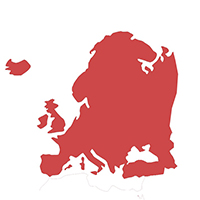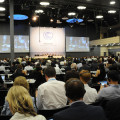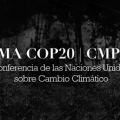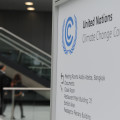Negotiations continued at a slow pace on Tuesday which saw Saudi Arabia get criticised for blocking discussion on the 2013-2015 review, which could strengthen the global goal to limit warming to below 1.5°C. Meanwhile, much of the action was reportedly taking place behind closed doors in bilateral discussions.
John Knox, the UN Special Rapporteur on Human Rights and Environment, held an informal meeting with civil society observers to answer questions and receive input on his work regarding the human rights dimensions of climate change. There has been an increasing focus on the intersection between environmental and human rights issues, as civil society moves to placing humans front and centre in policy debates.
Knox stressed the impact that even a 2°C temperature rise would have on human rights. He answered questions relating to the operationalisation of human rights protection mechanisms. “I want to invite you to give me information, insights…that you think would be useful for me to have,” he said to members of civil society.
While civil society members were being invited to speak, on another front they were fighting to have their voices heard. The Subsidiary Body for Implementation (SBI) held consultations on budget for the next biennium. The budget scenarios presented the possibility of reduced observer participation and a fee for side events. Civil society and businesses fought back. One observer representing businesses asked in the budget consultation: “Do you really want to cut off this arm?”
As part of the Ad Hoc Working Group on the Durban Platform for Enhanced Action (ADP), parties had the chance to present progress on their Intended Nationally Determined Contributions (INDCs).
New Zealand and the Marshall Islands were among the countries to make brief interventions about their experiences thus far, not having submitted their INDCs yet. Both governments showed a marked interest in public consultation. New Zealand reported that it had just finished a month-long public consultation process, involving meetings with indigenous populations and review of over 17,000 public submissions . Mexico claimed to have undertaken a “long and intense” public consultation process, and a delegate from South Korea requested more information about the challenges encountered.
Meanwhile, World Wide Views – a “global citizen consultation initiative” – and the UN Climate Change Secretariat issued a statement that the global consultation on over 10,000 citizens’ opinions on climate change would be presented on Wednesday. This is expected to amplify the current dialogue surrounding stakeholder participation.
Progress was also made on other issues: Morocco presented its INDCs, which included adaptation goals and are conditional on other countries’ support (in the order of $35 billion) and a legally binding agreement. Elements of gender and human rights were also noted in Morocco’s commitment. An agreement was also finalised on Reducing Emissions from Deforestation & Forest Degradation (REDD+). This agreement comes ten years after Papua New Guinea first proposed a mechanism to protect tropical forests on behalf of the Coalition for Rainforest Nations.
As the African proverb goes, “if you want to go fast, go alone; if you want to go far, go together.” Is there a way to go fast while engaging the voices of stakeholders involved? In preparing for Paris, inclusivity remains a challenge.
The Verb will be on the ground in Bonn to cover the UN climate change conference as it unfolds over 1-11 June 2015













comment